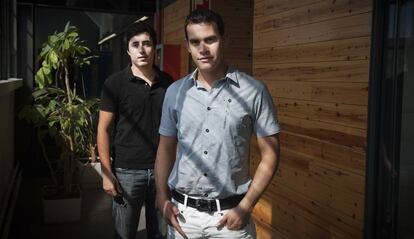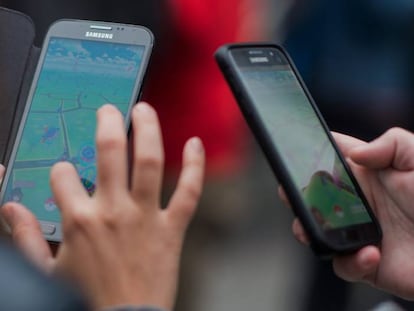Spanish mobile game developer snapped up for $250 million
US giant Take-Two buys Barcelona-based Social Point, set up in 2008 by two graduates

The smartphone games created by Social Point take place in fantasy worlds, where users can, for example, create cities inhabited by friendly dragons that interbreed, producing new species. While they might look like something out of the global phenomenon Pokémon, they were actually born in Barcelona, in a company that was forged out of the dream of two friends who, after graduating with degrees in Computer Engineering from Barcelona Tech (UPC), traveled to France to learn how to set up a business.

This they managed in 2008. Since then, Horacio Martos and Andrés Bou, both in their early thirties, have established themselves as leaders in Spain’s videogame sector. Now, US giant Take-Two, a publisher and distributor of videogames whose products include the popular Grand Theft Auto series, has bought the company for $250 million (around €234 million).
“It’s a huge success, but a bittersweet one,” says Gonzo Suárez, co-founder of the videogame congress Gamelab. Successful companies “always end up being sold,” he notes, adding that for him, this often means losing their original appeal.
The government should see videogames as a strategic sector José María Moreno, head of the Spanish Association of Videogames
But Martos and Bou are overjoyed, as they pointed out in a press release (they refused to be interviewed). They’ve come a long way since 2011, when they celebrated a €2.4-million investment by Nauta Capital. The company is now worth almost 10 times that.
Take-Two hopes the acquisition will strengthen its hand in the free-to-play mobile gaming market. The company, which until now has focused on console and PC formats, sees a proven track record of growth in Social Point that shows no sign of slowing down. The reasons: a portfolio of products still to be launched in the vast Asian market.
Some 300 employees, a turnover of €85 million in 2015 and 180 million downloads are the kind of figures that Martos and Bou could only dream of when they were studying at business school. What’s more, 50% of revenue comes from the United States, a key factor in the multimillion acquisition.
Four years ago, Social Point’s founders had highlighted the difficulties of finding funding in Spain. “The amounts we were looking for, between €5 and €6 million, weren’t happening in Spain,” Bou told EL PAÍS in January 2013.
Take-Two hopes the acquisition will strengthen its hand in the free-to-play mobile gaming market
Suárez says the key to the pair’s success has been that “they were never afraid of competing with the big multinationals,” earning themselves a global reputation in the process. Dragon City and Monster Legends, their two flagships, are now played in Europe, Latin America, the Middle East and Africa.
In Spain, 1% of companies in the electronic games sector control 52% of turnover; Social Point has a 16.7% share of the pie.
José María Moreno, head of the Spanish Association of Videogames (AEVI), says the acquisition of Social Point “will allow further development of videogames in Spain, with new projects with a global dimension.” Moreno says he hopes investments such as Take-Two’s “will help raise the profile of the sector in terms of economic policies,” adding that the Spanish government should see videogames as a “strategic sector” in the same way that countries such as Canada have.
English version by Nick Lyne.
Tu suscripción se está usando en otro dispositivo
¿Quieres añadir otro usuario a tu suscripción?
Si continúas leyendo en este dispositivo, no se podrá leer en el otro.
FlechaTu suscripción se está usando en otro dispositivo y solo puedes acceder a EL PAÍS desde un dispositivo a la vez.
Si quieres compartir tu cuenta, cambia tu suscripción a la modalidad Premium, así podrás añadir otro usuario. Cada uno accederá con su propia cuenta de email, lo que os permitirá personalizar vuestra experiencia en EL PAÍS.
En el caso de no saber quién está usando tu cuenta, te recomendamos cambiar tu contraseña aquí.
Si decides continuar compartiendo tu cuenta, este mensaje se mostrará en tu dispositivo y en el de la otra persona que está usando tu cuenta de forma indefinida, afectando a tu experiencia de lectura. Puedes consultar aquí los términos y condiciones de la suscripción digital.









































